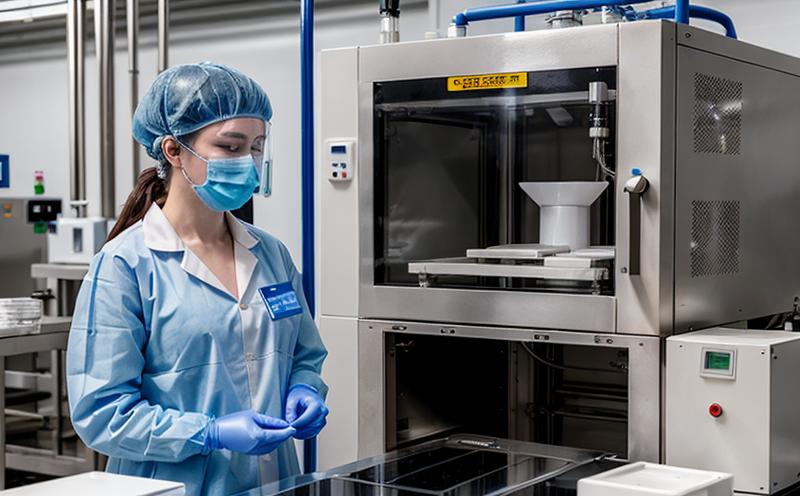GMP Antimicrobial Effectiveness Testing
In the realm of pharmaceutical manufacturing, ensuring product quality and safety is paramount. Good Manufacturing Practice (GMP) compliance is a cornerstone of this assurance, underpinning the production processes that ensure drugs are safe for use. Within GMP, antimicrobial effectiveness testing stands out as an essential component to guarantee that products maintain their efficacy throughout their shelf life.
Antimicrobials play a crucial role in pharmaceuticals by preventing or eliminating microbial growth, thereby extending product stability and safety. This testing ensures that the antimicrobial properties of ingredients are stable under various conditions encountered during manufacturing and storage. The test involves exposing the antimicrobial agent to controlled environmental factors simulating real-world scenarios such as temperature variations, humidity changes, and exposure to light.
The goal is to assess whether the antimicrobial retains its efficacy over time without compromising other product attributes like stability or purity. This testing method typically follows a standardized protocol that aligns with international standards such as ISO 18156 for pharmaceutical products. The test requires precise control of environmental variables, ensuring accurate results.
The process begins by selecting the appropriate antimicrobial agent and preparing it in accordance with the GMP guidelines. Specimens are then exposed to defined conditions designed to mimic actual storage or use environments. After a specified duration, the specimens undergo analysis to determine if the antimicrobial has maintained its effectiveness against targeted microorganisms.
The significance of this test cannot be overstated. It ensures that pharmaceutical products meet stringent regulatory requirements and maintain their therapeutic value throughout their lifecycle. This is particularly critical in industries where product integrity directly impacts patient health and safety.
By adhering to GMP standards, pharmaceutical companies can demonstrate compliance with regulations such as those outlined by the FDA, EMA, or WHO. The results of these tests provide assurance that products are safe for consumption, which is crucial given the increasing complexity and global reach of the pharmaceutical market.
In summary, GMP antimicrobial effectiveness testing is a vital step in ensuring product quality and safety. It aligns with broader GMP principles to uphold the integrity of pharmaceutical manufacturing processes. This service plays a critical role in safeguarding public health by confirming that products remain effective under various conditions throughout their shelf life.
Why Choose This Test
Selecting the right test is crucial for maintaining compliance and ensuring product quality. GMP antimicrobial effectiveness testing offers several advantages over other methods:
- Regulatory Compliance: Ensures adherence to international standards like ISO 18156, which are critical for regulatory approval.
- Precision and Accuracy: Utilizes controlled environmental conditions that closely mimic real-world scenarios, providing reliable results.
- Consistency: Provides consistent data that can be replicated to ensure reliability across different batches or production runs.
- Risk Mitigation: Identifies potential issues early in the manufacturing process, minimizing the risk of product recalls and associated costs.
- Patient Safety: Guarantees that products remain effective against targeted microorganisms, enhancing patient trust and confidence.
The benefits extend beyond compliance; they contribute to a robust quality assurance program that supports long-term success in the pharmaceutical industry. By choosing this test, companies can ensure their products meet the highest standards of safety and efficacy.
Customer Impact and Satisfaction
GMP antimicrobial effectiveness testing has a direct impact on customer satisfaction by ensuring product quality and reliability. Customers expect pharmaceutical products to be safe, effective, and consistent in performance. By adhering to rigorous testing protocols, companies can meet these expectations:
- Increased Customer Trust: Consistent results build trust with customers, enhancing brand reputation.
- Patient Safety: Ensures that products remain safe for use even under varying conditions, reducing the risk of adverse reactions.
- Longevity of Products: By maintaining efficacy over time, companies can extend product shelf life, making them more reliable and cost-effective.
- Positive Regulatory Interaction: Compliance with GMP standards facilitates smoother interactions with regulatory bodies, potentially leading to faster approvals.
Incorporating this testing into the manufacturing process not only meets customer demands but also enhances overall satisfaction. Companies that invest in such robust quality assurance programs are more likely to retain loyal customers and attract new ones.
Use Cases and Application Examples
| Use Case | Description |
|---|---|
| Prescription Drug Manufacturing: | Ensuring that antimicrobial agents in prescription drugs remain effective over time, thereby maintaining product stability and safety. |
| Vaccine Production: | Making sure the vaccine retains its efficacy against targeted pathogens despite potential exposure to environmental factors during storage. |
| Biotherapeutic Development: | Verifying that biopharmaceuticals continue to be free from microbial contamination, ensuring their safety and effectiveness. |
| Sterile Pharmaceutical Products: | Evaluating the antimicrobial properties of ingredients in sterile products like intravenous solutions or eye drops. |
| Antibiotic Formulations: | Confirming that antibiotics maintain their potency against targeted bacteria, ensuring effective treatment. |
| Over-the-Counter Medications: | Ensuring over-the-counter products like antiseptics and topical treatments remain effective under various conditions. |
| Cosmetics Containing Antimicrobial Ingredients: | Evaluating the antimicrobial efficacy of ingredients in cosmetic products, ensuring they do not compromise product quality or safety. |
| Pharmaceutical Packaging: | Testing the packaging materials to ensure they provide adequate protection against microbial contamination and environmental factors. |
The diverse applications of this testing underscore its importance across various sectors within the pharmaceutical industry. By incorporating GMP antimicrobial effectiveness testing, companies can address a wide range of challenges and enhance product quality and safety.





